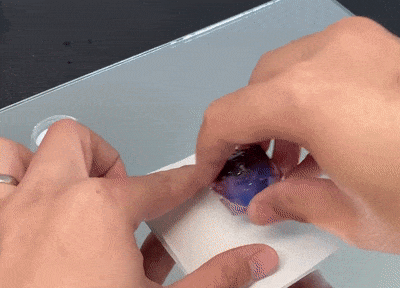Not satisfied with your finished epoxy project because of the frosted surface and the rough edge? Want to polish your resin but don't know how to start? In this blog post, we will discuss when and how to polish your resin, as well as alternative ways to make resin shiny.
What Is Resin Polishing
Resin polishing is the process of smoothing and shining the surface of cured resin to create a glossy, reflective finish. This process involves removing any imperfections, such as bubbles or uneven surfaces, and creating a smooth shiny glass-like surface.
 Source: BuzzingFish
Source: BuzzingFish
When Do You Need to Polish Resin
Polishing epoxy resin is not always necessary, but it can be beneficial if you want to improve the overall appearance of your project. You may need to polish resin if you have created a piece with a dull or uneven surface. Additionally, polishing can help to enhance the beauty and depth of colors within the resin. Keep in mind that polishing can be a time-consuming process, so it's important to weigh the benefits against the amount of time and effort required.
How to Polish Epoxy Resin
1. Preparation - Clean the Resin
Before polishing, ensure the surface is clean and free of debris. Wipe it down with a damp cloth or alcohol to remove any dirt or residue.
2. Preparation - Sand the Surface
If your resin has scratches or rough areas, you may need to sand it first. Use sandpapers and water to sand the surface of the resin. Begin with a low grit sandpaper, such as 400 grit, then gradually increase the grit to 600 grit, 800 grit, 1000 grit, 2000 grit until you reach 5000 grit. This will help to smooth out any bumps or imperfections on the surface of the resin. If you want to learn more about sanding resin, please check this article.

3. Apply a Polishing Compound
Apply a small amount of polishing compound onto the surface of the resin. You don't need too much. Just spread the compound around the area where you want to polish it.

4. Buff the Surface and Repeat the Process
Place a microfiber soft cloth or a polishing pad on a stable table to buff the surface of the resin. And then you'll turn your piece upside down, and use a circular motion to begin polishing your piece.
You need to put some effort into this because it's your weight on the piece that's going to make it shine. Repeat the process until you're satisfied with the results.

5. Clean the Surface and Repeat the Process if Needed
Once you have finished polishing, wipe the surface down with a clean, dry cloth to remove any excess compound.
How to Make Resin Shiny If Don't Want to Polish
If you prefer not to go through the polishing process, there are other ways to make your resin shiny:
1. Apply a Resin Clear Coat: A resin clear coat can help to enhance the shine of your resin without the need for polishing.

2. Use a Resin Gloss Sealer: Another option is to use a resin gloss sealer. The spray can be applied to the surface of the resin to create a glossy, reflective finish.

Best Polishing Compound for Resin
It's important to choose a compound that is specifically designed for use on epoxy surfaces and is compatible with your specific type of resin. Flitz Polish is the finest polishing compound I have discovered for working with resin.
It stands out as the only non-toxic option available, and is both acid-free and non-abrasive. In addition, it is an environmentally friendly product, so no pressure when using it. Furthermore, it comes with a high-quality, thick microfiber cloth that is perfect for polishing resin, as well as a guide containing tips and techniques.
Which Resin Objects Can Be Shine Polished
Many different types of resin objects can be shine polished, including jewelry, tabletops, and art pieces. However, it's important to note that some objects may require additional preparation before polishing, such as sanding or cleaning.
Conclusion
Epoxy resin polishing is a great way to enhance the beauty and shine of your resin creations. With proper preparation, the right polishing compound and a little bit more patience, you can achieve a smooth, reflective finish that will make your resin creations truly stand out.

